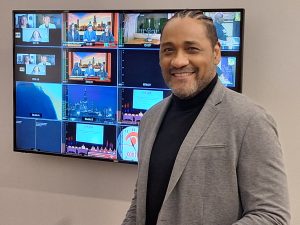Public access network marks 40th year
By Kevin Beese Staff Writer — December 6, 2023
Darrious Hilmon, executive director of CAN TV, stands in front of a screen broadcasting the public access network’s five stations in Chicago. (Photo by Kevin Beese/Chronicle Media)
First of two stories looking at CAN TV and the future of public access television
Growing up with a lisp and stutter, Darrious Hilmon would mouth the words of the black anchors of the noon newscasts on Detroit television.
Having a “horrible babysitter,” he spent a lot of time as a kindergartner watching TV and became fascinated with public access channels and longtime Detroit Mayor Coleman Young. He watched meetings on public access as Young cursed out Detroit City Council members.
“Now if my mom was paying attention — but she was busy working multiple jobs — she would know that some of that was probably language I shouldn’t have heard, but it was powerful,” Hilmon said.
Fast forward to his first internship on “Detroit Black Journal” on the Motor City’s PBS station and Hilmon’s love of storytelling, community access and public broadcasting were solidified.
Putting all those things together, he now serves as executive director of CAN TV, Chicago’s community access television, an organization marking its 40th year of existence.
“For someone like me for whom words were hard to come by, I have such a deep respect for them. They are tangible, palatable things,” Hilmon said.
He said an African proverb illustrates the need for all individuals to get their viewpoints out.
“Until the lion tells the story, the hunter is always the hero, and the best place to empower the lion with the tools to tell his, her or their story is community access,” Hilmon said. “The training, the tools, it is the one bastion of the mainstream media, especially in the third largest market in the country, where every commercial station here basically is a know-it-all … we do have to meet our audience. There is a difference between being available and being accessible.”
He said community access television can help remind people about disagreeing without being disagreeable.
“Part of the challenge … is that we only want to listen to people who agree with us,” Hilmon said. “Now, you can curate your experience where you only have to listen to people who agree with you.”
He said as a gay, Black man in America, he has views on issues.
“But as the executive director of CAN TV, as the person who should be one of the leaders of protecting free speech and the right to disagree and the right to hear all sides, we don’t even tell our viewers what to think,” Hilmon said. “We need to present as many views as possible to our viewers.”
With more people turning to streaming services, CAN has seen a 30 percent drop in funding from cable companies during the past six years. As 99 percent of CAN’s budget comes from the cable franchise fees, the public access network will have to make changes in the future. Hilmon noted that as soon as 2026, cable dollars for community access may completely go away.
“If we want to continue to have this space and this privilege of serving, we have got to engage in a way that we have never had to,” the CAN executive director said.
Hilmon said underwriting support for programs is something that will likely become more common for future community access shows.
“We have between now and 2026 to put ourselves in a position where we’re just not nice but we’re necessary,” Hilmon said, “where for us not to be here, people will feel a loss.”







